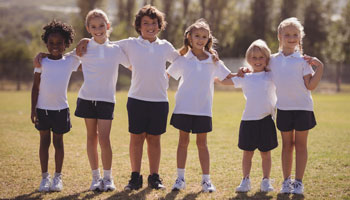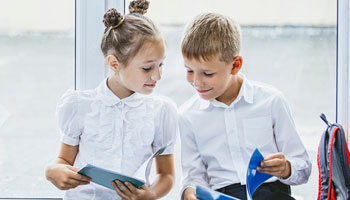Explore these essential capabilities for student wellbeing that will support students throughout their lives.
Social and emotional learning (SEL) supports students in many aspects of their wellbeing and academic success. It helps them to acquire and apply the knowledge, attitudes, and skills necessary to understand and manage emotions, set and achieve positive goals, feel and show empathy for others, establish and maintain positive relationships, and make responsible decisions.

Social and emotional learning includes forming positive relationships and working in teams.
What is social and emotional learning?
These five SEL skills or capabilities are developed through explicit instruction, peer and adult modeling, and opportunities to practice or rehearse skills across a range of contexts. These contexts include NSW Syllabus Key Learning Areas, the playground, the sports field and at home.
- Self-management: managing emotions and behaviours to achieve goals.
- Self-awareness: recognising emotions and values as well as strengths and challenges.
- Responsible decision-making: making ethical, constructive choices about personal and social behaviour.
- Relationships skills: forming positive relationships, working in teams and dealing effectively with conflict.
- Social awareness: showing understanding and empathy for others.
Why is social and emotional learning necessary?
Effective K-12 SEL pedagogy enhances both academic and wellbeing outcomes. SEL capabilities help students of all ages acquire crucial friendship-making skills and develop their self-confidence. The more opportunities students have to rehearse these skills, the more likely they are to develop social competence and pro-social behaviours eg meeting new friends, joining new friendship groups, bouncing back from friendship difficulties.

Effective social and emotional pedagogy enhances both academic and wellbeing outcomes.
How to support students to practice social and emotional learning
Deliberate and targeted whole-school initiatives can develop SEL skills. This is best achieved through explicit teaching and learning strategies complemented by parent/carer education and support.
The NSW PDHPE K-10 Syllabus skill domains are central to the explicit teaching of SEL. Personal and Social Capabilities are included in all NESA syllabus documents and provide further opportunities for teaching of SEL skills in a range of different key learning areas. In addition, SEL skills can be explicitly taught and rehearsed in wellbeing, sport, and co-curricular activities. Schools can access and can seek support from AISNSW to implement and integrate them effectively to meet the needs of their students and school context.
Considerations for a whole-school approach to social and emotional learning
SEL should be part of a whole school wellbeing approach. A comprehensive SEL pedagogy includes education for all key stakeholders and the use of evidence-based resources suitable for individual school contexts. Schools may like to consider the following reflective questions:
- How does the school implicitly and explicitly teach SEL?
- How can schools effectively embed social and emotional language with students and staff?
- What opportunities are provided for parent education in relation to SEL?
- How might schools select resources to ensure they are best suited to student needs and school context?
- What processes are in place to consider the effectiveness of SEL interventions and strategies?

Social and emotional learning aligns with the whole school wellbeing approach.
AISNSW social and emotional learning support
AISNSW Wellbeing Consultants recently launched a 12-part wellbeing podcast series available for member schools. Episodes one, eight and 12 are related to SEL theory, pedagogy, and school-based practice. Access these resources via the AIS Wellbeing website.
A one-page PDF infographic related to SEL can be downloaded here.
Webinars
AISNSW will be offering the webinar An Introduction to Social and Emotional Learning on Wednesday, 14 October.
A whole-day event Social and Emotional Learning in Schools: A Practical Approach will run on Wednesday, 4 November.
Daily whole-school wellbeing updates are available via @AISNSWWellbeing Twitter and Wellbeing in Education Facebook Group.